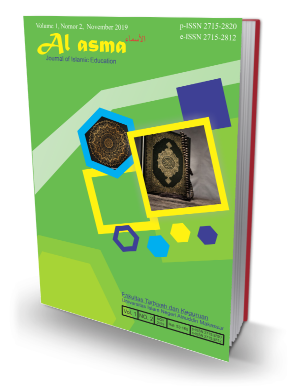PENGEMBANGAN INSTRUMEN TES HIGHER ORDER THINKING SKILL (HOTS) PADA POKOK BAHASAN SISTEM PERSAMAAN LINEAR DUA VARIABEL DAN TEOREMA PYTHAGORAS
Abstract
Abstrak
Penelitian ini bertujuan untuk mengembangkan instrumen tes berstandar HOTS dalam bentuk uraian sesuai kriteria validitas, daya pembeda, tingkat kesukaran, serta reliabilitas. Penelitian ini masuk dalam jenis penelitian dan pengembangan. Prosedur yang digunakan ialah desain formatif dari tessmer yang terdiri dari preliminary, self evaluation, prototyping, and field test. Subyek yang dipilih ialah siswa dari kelas VIII SMP Citra Samata. Data-data dikumpulkan melalui tes, sedangkan instrumen yang digunakan berupa lembar tes dan validasi. Instrumen yang digunakan masuk ke kategori valid yaitu Va 4,13. Reliabilitas yang didapatkan yaitu 0,69 dengan ketegori tinggi. Berdasarkan kriteria kualitas instrumen tes diketahui bahwa terdapat 10 soal mempunyai daya pembeda yang memenuhi kriteria sedangkan 5 soal tidak memenuhi daya pembeda.
Abstract
This study aims to develop a HOTS standardized test instrument in the form of a description according to the criteria for validity, differentiation, difficulty level, and reliability. This research is included in the type of research and development. The procedure used is a Tessmer formative design consisting of preliminary, self-evaluation, prototyping, and field tests. The subjects chosen were students from class VIII SMP Citra Samata. The data were collected through tests, while the instruments used were test and validation sheets. The instrument used was included in the valid category, namely Va 4.13. The reliability obtained is 0.69 with high category. Based on the quality criteria of the test instrument, it is known that there are 10 questions that have discriminatory power that meet the criteria while 5 questions do not meet the discriminatory power.
Downloads
References
Afirda, Y. R., Sa’o, S., & Dhiki, Y. Y. (2020). Penerapan taksonomi Bloom dalam kemampuan berpikir menyelesaikan soal geometri pada siswa kelas VIII. JUPIKA:Jurnal Pendidikan Matematika Universitas Flores, 3(2), 121–130.
Effendi, R. (2017). Konsep revisi taksonomi Bloom dan implementasinya pada pelajaran matematika SMP. Jurnal Ilmiah Pendidikan Matematika, 2(1), 98–117.
Erniyanti, Junus, M., & Syam, M. (2020). Analisis ranah kognitif soal latihan berdasarkan taksonomi Bloom revisi pada buku fisika kelas X (studi pada buku karya Ni Ketut Lasmi). Jurnal Literasi Pendidikan Fisika, 1(2), 115–123. https://doi.org/https://doi.org/10.30872/jlpf.v1i2.337
Faisal, R. (2015). Pengembangan paket tes kemampuan berpikir tingkat tinggi (higher order thinking skill) berdasarkan taksonomi Bloom pada materi matematika kelas VII SMP. Universitas Jember, Jember.
Gunawan, I., & Palupi, A. R. (2016). Taksonomi Bloom–revisi ranah kognitif: kerangka landasan untuk pembelajaran, pengajaran, dan penilaian. Premiere Educandum: Jurnal Pendidikan Dasar dan Pembelajaran, 2(2).
Hamdi, S., Suganda, I. A., & Hayati, N. (2018). Developing Higher Order Thinking Skill (HOTS) tes instrument using lombok local cultures as contexts for junior secondary school mathematics. REiD (Research and Evaluation in Education), 4(2), 126–135.
Kurniawan, R. Y., & Lestari, D. (2019). The development assessment instrumens of higher order thinking skills on economic subject. Department of Economic Education, Faculty of Economics, Universitas Negeri Semarang, and ASPROPENDO, APRODIKSI & ASPAPI, 14(1). https://doi.org/https://doi.org/10.15294/dp.v14i1.19226
Ndiung, S., & Mariana Jediut. (2020). Pengembangan instrumen tes hasil belajar matematika peserta didik sekolah dasar berorientasi pada berpikir tingkat tinggi. Premiere Educandum: Jurnal Pendidikan Dasar dan Pembelajaran, 10(1), 94–111. https://doi.org/10.25273/pe.v10i1.6274
Netriwati. (2018). Penerapan taksonomi Bloom revisi untuk meningkatkan kemampuan pemahaman konsep matematis. Desimal: Jurnal Matematika, 1(3), 347–352. Retrieved from http://ejournal.radenintan.ac.id/index.php/desimal/index
Nur, F. (2017). Pengembangan bahan ajar matematika kelas VII SMP berdasarkan model pembelajaran Kolb-Knisley berbantuan geogebra sebagai upaya meningkatkan higher-order thinking skill dan apresiasi siswa terhadap matematika. MaPan : Jurnal Matematika dan Pembelajaran, 5(1), 96–109.
Nurfillaili, U., Yusuf, T. M., & Anggereni, S. (2016). Pengembangan instrumen tes hasil belajar kognitif mata pelajaran fisika pada pokok bahasan usaha dan energi SMA Negeri Khusus Jeneponto Kelas XI Semester I. Jurnal Pendidikan Fisika, 4(2), 83–87. Retrieved from http://journal.uin-alauddin.ac.id/indeks.php/PendidikanFisika
Okta, T. A. (2020). Pengembangan soal-soal sistem persamaan linear satu variabel berbasis higher order thinking skills pada siswa kelas VII SMP Negeri 3 Bajo Kab. Luwu. Institut Agama Islam Negeri (IAIN) Palopo.
Saraswati, I. G. A. A., Suharta, I. G. P., & Pujawan, I. G. N. (2020). Peningkatan kemampuan berpikir kreatif matematika siswa melalui penerapan model pembelajaran kooperatif dengan strategi aptitude treatment interaction. Jurnal Pendidikan Matematika Undiksha, 11(2), 36–41.
Setiadi, H. (2016). Pelaksanaan penilaian pada kurikulum 2013. Jurnal Penelitian Dan Evaluasi Pendidikan, 20(2), 166–178. Retrieved from http://journal.uny.ac.id/index.php/jpep
Sridadi, & Utama, A. B. (2016). Pengembangan instrumen tes keterampilan dasar bolatangan bagi mahasiswa. Jurnal Pendidikan Jasmani Indonesia, 12(2), 110–116. https://doi.org/https://doi.org/10.21831/jpji.v12i2.17110
Subagia, I. W., & Wiratma, I. G. L. (2016). Profil penilaian hasil belajar siswa berdasarkan kurikulum 2013. Jurnal Pendidikan Indonesia, 5(1), 39–54.
- Authors retain copyright and grant the journal right of first publication with the work simultaneously licensed under a Creative Commons Attribution License that allows others to share the work with an acknowledgement of the work's authorship and initial publication in this journal.
- Authors are able to enter into separate, additional contractual arrangements for the non-exclusive distribution of the journal's published version of the work (e.g., post it to an institutional repository or publish it in a book), with an acknowledgement of its initial publication in this journal.
- Authors are permitted and encouraged to post their work online (e.g., in institutional repositories or on their website) prior to and during the submission process, as it can lead to productive exchanges, as well as earlier and greater citation of published work (See The Effect of Open Access).

